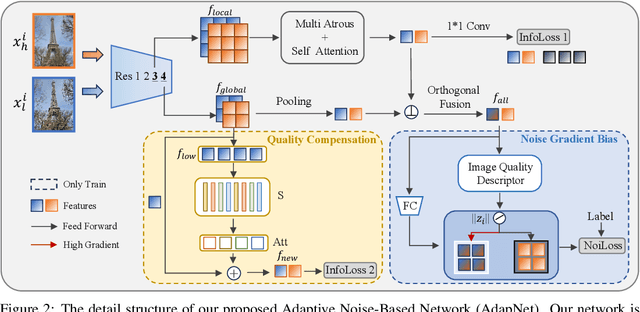Sihe Zhang
AdapNet: Adaptive Noise-Based Network for Low-Quality Image Retrieval
May 28, 2024



Abstract:Image retrieval aims to identify visually similar images within a database using a given query image. Traditional methods typically employ both global and local features extracted from images for matching, and may also apply re-ranking techniques to enhance accuracy. However, these methods often fail to account for the noise present in query images, which can stem from natural or human-induced factors, thereby negatively impacting retrieval performance. To mitigate this issue, we introduce a novel setting for low-quality image retrieval, and propose an Adaptive Noise-Based Network (AdapNet) to learn robust abstract representations. Specifically, we devise a quality compensation block trained to compensate for various low-quality factors in input images. Besides, we introduce an innovative adaptive noise-based loss function, which dynamically adjusts its focus on the gradient in accordance with image quality, thereby augmenting the learning of unknown noisy samples during training and enhancing intra-class compactness. To assess the performance, we construct two datasets with low-quality queries, which is built by applying various types of noise on clean query images on the standard Revisited Oxford and Revisited Paris datasets. Comprehensive experimental results illustrate that AdapNet surpasses state-of-the-art methods on the Noise Revisited Oxford and Noise Revisited Paris benchmarks, while maintaining competitive performance on high-quality datasets. The code and constructed datasets will be made available.
 Add to Chrome
Add to Chrome Add to Firefox
Add to Firefox Add to Edge
Add to Edge